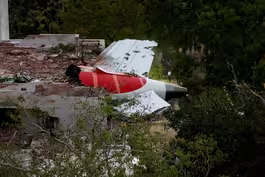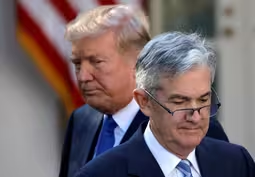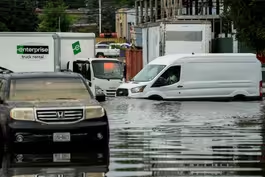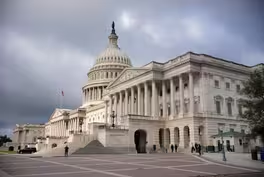
Will Trump's shift on Ukraine help end war? Experts weigh in
Clip: 7/15/2025 | 8m 37sVideo has Closed Captions
Will Trump's shift on arming Ukraine help end Russia's invasion? Experts weigh in
In announcing a new weapons package for Ukraine and a ceasefire deadline for Putin, President Trump reversed his previous stance towards Russia’s invasion. But will the weapons have the intended effect for Ukraine, or does the deadline give Russia weeks more to continue its onslaught? William Brangham has views from Kimberly Kagan and Jennifer Kavanagh.
Problems playing video? | Closed Captioning Feedback
Problems playing video? | Closed Captioning Feedback
Major corporate funding for the PBS News Hour is provided by BDO, BNSF, Consumer Cellular, American Cruise Lines, and Raymond James. Funding for the PBS NewsHour Weekend is provided by...

Will Trump's shift on Ukraine help end war? Experts weigh in
Clip: 7/15/2025 | 8m 37sVideo has Closed Captions
In announcing a new weapons package for Ukraine and a ceasefire deadline for Putin, President Trump reversed his previous stance towards Russia’s invasion. But will the weapons have the intended effect for Ukraine, or does the deadline give Russia weeks more to continue its onslaught? William Brangham has views from Kimberly Kagan and Jennifer Kavanagh.
Problems playing video? | Closed Captioning Feedback
How to Watch PBS News Hour
PBS News Hour is available to stream on pbs.org and the free PBS App, available on iPhone, Apple TV, Android TV, Android smartphones, Amazon Fire TV, Amazon Fire Tablet, Roku, Samsung Smart TV, and Vizio.
Providing Support for PBS.org
Learn Moreabout PBS online sponsorshipWILLIAM BRANGHAM: In announcing a new weapons package for Ukraine yesterday and a 50-day deadline for Russia to agree to a cease-fire, President Trump reversed his previous stance towards Russia's invasion.
Today, he reiterated the economic pain Russia would face if it violated his deadline, but also cautioned Ukraine not to go too far.
QUESTION: What happens now?
Do you talk to Vladimir Putin?
DONALD TRUMP, President of the United States: Well, at the end of 50 days, if we don't have a deal, it's going to be too bad.
QUESTION: Should Zelenskyy target Moscow or deeper into Russia?
DONALD TRUMP: No, he shouldn't target Moscow.
Oh, I don't think 50 days is very long, and it could be sooner than that.
I don't think 50 days is very long.
WILLIAM BRANGHAM: But will yesterday's announcement of new weapons have the intended effect, or does this new deadline give Russian President Vladimir Putin weeks more to continue his onslaught?
For perspective on all this, we get two views.
Kimberly Kagan is the president of the Institute for the Study of War, a Washington think tank.
And Jennifer Kavanagh is a senior fellow and director of military analysis at Defense Priorities, which advocates for restraint in U.S. foreign policy Kimberly Kagan and Jennifer Kavanagh, great to have you back on the program.
Kim Kagan, to you first.
The president and NATO Secretary-General Mark Rutte yesterday made this announcement, and the president has presented this as a real boost for Ukraine and a real threat to Russia.
Do you see it that way?
KIMBERLY KAGAN, President, Institute for the Study of War: President Trump's decision to allow Europeans to buy American weapons and thus support Ukraine on the battlefield is fundamental and important.
It's important to Ukraine's ability to plan and sustain its battlefield campaigns, and it's extremely important in telling Putin that the United States will stand behind its allies and partners and that the United States will in fact use force or help with the use of force to bring Putin to the negotiating table.
WILLIAM BRANGHAM: Jennifer Kavanaugh, how do you see this?
Do you think this will be a real lever to bring Putin to the negotiating table?
JENNIFER KAVANAGH, Defense Priorities: I don't.
Militarily, I see yesterday's announcement as a lot more show than substance.
U.S. and European stockpiles are very low right now.
There is not that much in them.
So the aid that can arrive quickly is very limited in quantity and types of weapons.
So the bottom line is that the military balance isn't going to change that much.
There's also been a lot of focus here on defensive weapons, Patriots, interceptor missiles.
Those are great for defending Ukrainian cities.
They're not going to change things for front-line soldiers.
So in my view this announcement may seem like a big step forward.
It certainly is a politically significant move for President Trump, but militarily it makes very little difference for the Ukrainians and won't change the trajectory of the war.
WILLIAM BRANGHAM: Kim Kagan, what do you make of that, that this, it does seem to be a big reversal for Trump, but may not move the needle too much on the battlefield?
KIMBERLY KAGAN: First of all, it is important that Ukraine be able to defend its cities.
It is also important that Ukraine be able to defend its defense industry and its defense industrial base, which is actually extremely productive and very important to Ukraine's war-waging and war-fighting capacity.
The Russians are not making material gains on the battlefield right now.
Since the beginning of 2025, they have advanced really a distance that is about three-fifths the size of Rhode Island.
And they have lost 100,000 soldiers in doing so.
That's a huge loss for very little game.
Finally, Putin needs to know that he cannot win on the battlefield.
And the best way to do that is to show him that his advances are slowing and that the Ukrainians can retake territory.
WILLIAM BRANGHAM: Jennifer Kavanaugh, we heard the president just a few moments ago say, I'm giving these weapons to Ukraine, but I don't want them to direct those weapons at Moscow or deeper into Russia itself.
Is that wise for him to say that, given that Russia, who's the invader in this circumstance, has shown no hesitancy about doing exactly that to Ukraine?
JENNIFER KAVANAGH: I do think it's the right statement and guidance for the president to give here.
The reality is that Ukraine does not have that many missiles left right now that can fire deep into Moscow.
I think they have less than 20 of the ATACMS, which are the longest-range missile that the United States has provided for them.
So that's not a lot.
And they can't even reach to Moscow.
Their range is more limited, under 200 miles.
So their capabilities are limited.
But the bigger issue here is the escalation risk.
Firing deep into Moscow runs a significant escalation risk.
Russia still has a powerful nuclear arsenal and a lot of conventional weapons that they have not used on the battlefield in Ukraine.
For the United States, which has limited interest set stake in Ukraine, it makes zero sense to run any sort of escalation risk by encouraging Ukraine to strike deep into Russia.
So I do agree with the president's guidance here.
WILLIAM BRANGHAM: Kim Kagan, what about that, fear of legitimate escalation by Russia if Ukraine shoots deep into Russia?
KIMBERLY KAGAN: First of all, Ukraine has been conducting strikes in Russia, including through its exquisite drone program, as we saw over the summer.
Putin has not escalated with nuclear weapons.
So the president is right to be concerned about that, but I think we have learned a lot about Putin's unwillingness to risk his -- the credibility of his nuclear deterrent by using it, and instead just try to exercise his nuclear capability by saber-rattling.
WILLIAM BRANGHAM: I want to ask you both one final question.
Jennifer, to you first.
The president has established this 50-day deadline and says, Putin, if you don't get to the negotiating table by then, here comes the economic pain.
The flip side of that is that that's 50 days of carte blanche for Putin to do whatever he wants.
We know some in Russia are actually celebrating this extra 50 days.
Do you think that's a fair criticism?
JENNIFER KAVANAGH: Well, I think the 50-day deadline is counterproductive for a number of reasons, the first being that it does get Putin an incentive to try to push as hard as he can, maybe not do whatever he wants, but try to push as hard as he can and consolidate his gains.
The second issue here is that it puts President Trump in a corner.
Now, at the end of 50 days, if Putin doesn't come to the table, he's forced to make a tough decision.
Does he want to impose economic penalties on close partners like India and Europe that will reverberate on the United States?
Or does he want to back down and look weak in Putin's eyes?
So he's placed himself in a really tough position that call his own credibility to account.
And, ultimately, I don't think that Putin cares that much about artificial deadlines.
He has a set of goals that he aims to achieve and he will keep pushing until he achieves them.
WILLIAM BRANGHAM: Kim Kagan, what's your response to that?
KIMBERLY KAGAN: Putin has already been using everything that he has against Ukraine.
We see that in the way that he uses his drones, his missiles every night against Ukrainian cities and the way he wastes men on the front lines to try to move the front lines forward.
So Putin's already giving everything he's got.
And so the 50 days are perhaps a constraint on President Trump, but they are not material for the way that Putin is waging the war.
WILLIAM BRANGHAM: All right, Kimberly Kagan and Jennifer Kavanagh, thank you both so much for being here.
JENNIFER KAVANAGH: Thank you.
Air India crash report raises questions about pilots
Video has Closed Captions
Clip: 7/15/2025 | 6m 22s | Air India crash report raises questions about mental health care for pilots (6m 22s)
A Brief But Spectacular take on agrivoltaics
Video has Closed Captions
Clip: 7/15/2025 | 3m 1s | A Brief But Spectacular take on agrivoltaics (3m 1s)
How inflation, Trump complicate Fed's interest rate decision
Video has Closed Captions
Clip: 7/15/2025 | 6m 39s | How an inflation uptick and Trump's pressure complicate the Fed's interest rate decision (6m 39s)
News Wrap: 2 killed in New Jersey flash flood
Video has Closed Captions
Clip: 7/15/2025 | 5m 44s | News Wrap: 2 killed in New Jersey after vehicle swept away in flash flood (5m 44s)
Palestinian American comic uses humor to process war in Gaza
Video has Closed Captions
Clip: 7/15/2025 | 6m 55s | Palestinian American comedian uses humor to process the war in Gaza (6m 55s)
PEPFAR may escape White House attempt to cut its budget
Video has Closed Captions
Clip: 7/15/2025 | 5m 44s | AIDS program PEPFAR may escape White House attempt to cut its budget (5m 44s)
U.S. projects bringing water to drought-ridden land may end
Video has Closed Captions
Clip: 7/15/2025 | 8m 55s | Projects bringing water to drought-ridden land could end with USAID's dismantling (8m 55s)
Providing Support for PBS.org
Learn Moreabout PBS online sponsorshipSupport for PBS provided by:
Major corporate funding for the PBS News Hour is provided by BDO, BNSF, Consumer Cellular, American Cruise Lines, and Raymond James. Funding for the PBS NewsHour Weekend is provided by...


















